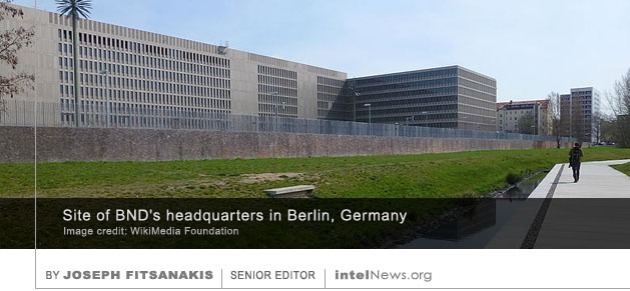Comment: Is Germany’s external spy agency a liability for Europe?
February 6, 2023 3 Comments
 GERMANY’S EXTERNAL INTELLIGENCE AGENCY, the Federal Intelligence Service (BND), constitutes a liability for Europe’s security and is in desperate need of a drastic and immediate overhaul. That is the conclusion of a blunt editorial penned last week by James Crisp, the Brussels-based Europe editor of Britain’s Daily Telegraph newspaper.
GERMANY’S EXTERNAL INTELLIGENCE AGENCY, the Federal Intelligence Service (BND), constitutes a liability for Europe’s security and is in desperate need of a drastic and immediate overhaul. That is the conclusion of a blunt editorial penned last week by James Crisp, the Brussels-based Europe editor of Britain’s Daily Telegraph newspaper.
Founded in the early stages of the Cold War under American tutelage, the BND operated for several decades on the frontlines of the existential clash between the United States and the Soviet Union. Deservedly, the agency received strong criticism about the Nazi past of some of its senior officials in the early days. Yet, like West Germany as a whole, by the 1970s it had largely managed to democratize its institutional structure and practices.
Crisp argues, however, that the BND, once one of Europe’s most important intelligence agencies, has been “hollowed out since the Cold War” and is today viewed by its European counterparts as “complacent and arrogant”. Consequently, the string of embarrassments that the BND has suffered lately, culminating in the discovery of an alleged Russian spy in its ranks, is hardly coincidental, according to Crisp. Even this recent discovery appears to have occurred only after the BND was tipped off by an allied intelligence agency.
The German spy agency has not fared much better in the American-led war in Afghanistan, or during the latest phase of the Russo-Ukrainian war. Unlike the American intelligence agencies, the BND did not subscribe to the view that Moscow would invade its neighbor to the west. Bruno Kahl, the agency’s president, was actually in Ukraine for consultations when Russian tanks began to head toward Kyiv. In what has rightly been described as a humiliation, Kahl was trapped inside Ukraine and had to be smuggled out of the country by a German special forces unit, just as Russian bombs began falling on the Ukrainian capital.
How does one account for the current state of the BND? To some extent, the spy agency’s culture has been shaped by that of the broader postwar German state, which has gone out of its way to reconcile with Russia. Successive German administrations have viewed their rapprochement with Moscow as a cornerstone of Europe’s security trajectory. Consequently, it can be said that Berlin has a history of underestimating the security threat posed by Russia.
At the same time, German society harbors a deep distrust toward state surveillance, something that stems from the once divided nation’s experience under Nazi and communist rule. This resentment only intensified after the reunification of Germany in 1990, and contributed to what some see as the “defanging” of the BND in the late 1990s. Crisp notes that the BND disbanded its counter-espionage unit in 1997, in an act of self-sabotage that was almost immediately exploited by Moscow.
The defunct unit was hurriedly re-assembled in 2017, in the aftershock of the Russian annexation of the Crimea. Six years later, it remains limited in both size and scope, with its current output falling considerably behind those of its counterparts in Western Europe. The recent discovery of a spy among it ranks is likely a direct outcome of that grave miscalculation.
Crisp’s conclusion is not particularly optimistic. Yet he recognizes that the BND is the external intelligence agency of Europe’s richest nation —a nation whose stance on the ongoing crisis with Russia is likely to affect the entire world. Berlin has a clear obligation to ensure that its intelligence agencies are able to meet the challenges of our time. Anything short of that would make the BND, and the totality of the German intelligence apparatus, a liability for all of Europe.
► Author: Joseph Fitsanakis | Date: 06 February 2023 | Permalink







BNS is infested with Russian and probably Chinese collaborators and should undergo a deep cleansing and re-shaping . Their modus operandi and status mentis should be reviewed and re-education commenced immediately.
CLEAN HOUSE. do a deep cleansing and start anew if necessary. BE HUMBLE And Hire CiA/Uk/Poles to help you out. BTW Hamburg port sold to china and Frankfurt airport 2 maybe to a Russian oligarch. Have they been vetted properly? Bedbugs spreading all over and into Europe soon.. How about France?
Looks like the BND (like the CIA’s “WMDs are being hidden” justifying the Iraq 2003 invasion) suffers from situating its intelligence assessments to back up national and/or NATO foreign policies.
Another loyal ally intelligence failure was with the CIA, BND and most other Western intel agencies, failing to predict the instant Taliban victory in Afghanistan in 2021. The line of the Obama, Trump and Biden administrations (that Afghan government forces alone could hold out for years against the Taliban) was conveniently, but wrongly, justified by US national intelligence assessments.
Of Western countries I think only the French DGSE (France frequently being out of step with US Policy prescriptions) correctly assessed the Taliban would win very quickly.
Furthermore, with the BND being seen by Germans as “secret police”, the BND probably suffers low morale, hence doesn’t attract high quality staff and still must follow US prescribed “NATO” policies (that set intelligence assumptions). This is especially over the endless Ukraine War, which is hurting German and UK consumers (attempting to heat their homes) in contrast to high energy prices overall benefit US energy exporters.